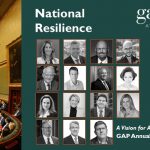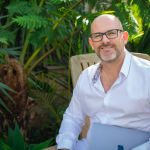7 ways to build your resilience

How would you describe 2020? The year of Disease? The year of Distancing? The year of Disruption?
Or maybe the year of Reset? Of Reinvention? Of Resilience?
Whatever your personal experience and perspective of 2020, one positive outcome from all of the disruption is that wellbeing and resilience have moved up both the corporate and the personal agendas. The role of mental resilience, in particular, has never had as much attention.
As we travel rapidly towards a new chapter, we all need our own resilience and wellbeing toolkit, and here are some very practical ways to help you Find EQUILIBRIUM across your whole life in order to set yourself up for success every day, despite the curve walls that will inevitably come your way.
The premise of Finding EQUILIBRIUM is that we as individuals need to find balance in our lives, not just work/life balance, but total life balance. Work, what we do every day, is an important component of a personal wellbeing strategy. We spend 1/3rd of our lives at work, so this time needs to be supporting and enabling our Total Wellbeing, rather than damaging it.
Mindset & Emotional wellbeing is the foundation of a personal resilience strategy. Research shows that leaders understand this, but are unclear about how to change!
To make it easier, and to set yourself up for success, The EQu system for Mindset & Emotional Wellbeing is a complete process to enable you to build your own personal Finding EQUILIBRIUM toolkit, and support your team and other people to do the same. It starts with the individual, simply because when we as individuals are balanced in our minds and emotions, that will have a positive ripple effect on our team, our culture and our business.
How it works?
Stage 1: Start Where you are!
So how do you make sure that you’re doing the right things to support yourself and set yourself up for success? You have to start with where you are which means taking stock of your strengths and your challenges right now.
From a business perspective, most people will be very familiar with the concept of a balance sheet, to get a snap shot of the score card of the health of a business right now. Well this concept can be equally applied to your whole life. We call it the balance sheet of life to enable us to get a true picture of where we are right now.
This Balance Sheet of Life exercise will help you to take a more objective and more balanced approach to your strengths and your challenges so that you can focus your resources on growth, by playing to your strengths. Research shows that people who use their strengths more:
- are more creative
- are more engaged in their work
- have more energy
- are more confident
Similarly, managers who focus on people’s strengths experience improved team performance, had lower levels of staff turnover, higher levels of productivity, more satisfied customers, and greater profitability.
Stage 2: Press RESET
So once you know where you’re starting, and you have a vision of your future, the challenge as we know is that things come along that push us off course. This time last year, I was in Bali and I took a whole week to really visualise what I wanted to focus on this year. And you know what, I didn’t get anything right.
Like everyone else, I have had to pivot and adapt as challenges have come my way.
2020 has been the big year of RESET, and you know what, 2021 looks like there’s going to be more of the same. So we have to be able to press RESET when we need to.
The good news is that Humans have been designed for survival and we are super adaptable as 2020 proved.Our amazing bodies have been designed with an inbuilt RESET button that we can leverage whenever we need to. It’s called BREATHING.
During those moments of stress, that could be triggered by both external events and internal thoughts of self-doubt, let those feelings and associated thoughts go and get back to a state of equilibrium so that you make better decisions.
Research has shown that changing how we breathe can change how we feel. As resilience specialist, Chibs Okereke says:
‘When we inhale, our heart rate speeds up. When we exhale, our heart rate slows down. Breathing out for twice as long as we breathe in, can start to calm our nervous system down in minutes if not seconds.’
Here’s a simple breathing exercise that you can apply whenever you need to Find your back to EQUILIBRIUM.
It’s called the 4, 7, 8 controlled breathing technique.
It’s really simple:
Breathe in for 4, hold for 7 and breathe out for 8
If you’re interested to learn more about the breath, issue 2 of the Equilibrium EGUIDE series is packed with proven tools, independent insights, and practical steps, to help you find YOUR equilibrium every day. You can download that from totalwellbeing.co.
Stage 3: Bring AWARENESS
Us humans are creatures of habit which are very useful as habits are automated behaviours which require a lot less energy and resources as we don’t need to apply conscious thought.
‘Habits are all about integrating certain practices into your life’.
However, not all habits continue to serve us and often we can go through our day allowing our autopilot to continue unchecked! This can lead to big problems!
To make sure that your autpilot is doing things that support the whole, you need to bring awareness to what the autopilot is actually doing! The things that our autopilot is taking care of for us, so that we can decide whether these choices are serving us, or not.
Your personal wellbeing Dashboard checklist – morning task
Here’s a great tool to help you do that efficiently. I call it ‘The Personal Wellbeing Dashboard.’ It has been designed to help you bring awareness to your autopilot and have the opportunity to upgrade your micro habits and to set yourself up for success that day by tracking key indictors like movement, mood, food in-take, sleep, spend and training. If you make this activity a consistent morning habit, spending just five minutes completing the Dashboard every morning, it will lead to: awareness, clarity and upgrades.
Just like in a business, if you don’t track and measure, things can easily get out of control and require a lot more energy to course correct.
‘What gets measured, get managed!’
Stage 4 & 5: Build your concentration and attention muscles
We are living through an amazing time of technological innovation that, in many cases, has made science fiction, science fact! We’re all benefiting in many ways.
I get to live in Australia, but co-create with colleagues in London, the US and Singapore. It’s incredible!
But there’s a downside! The downside is that there is so much competition for our attention, that, we can very easily feel overwhelmed and spend huge amounts of our day, scrolling through social media posts, checking emails and looking at news headlines.
In short, we can struggle to really focus and concentrate on one thing and pay attention for a period of time, robbing ourselves of the satisfaction of doing deeper work and the creations that would lead to.
We’re not short of big problems to solve! But to solve them, requires out of the box thinking that comes from the ability to concentrate and pay attention for periods of time!
As Cal Newport said in his book: ‘Deep Work’: ‘Concentration is the superpower of the 21st century’. I really like this.
However, research shows that many people struggle to concentrate even for a minute!
To get better at creatively solve big problems, we need to cultivate our concentration and attention muscle in ourselves. ‘Where attention goes, energy flows’
To help you build your concentration and attention muscle, in a world full of distractions, here’a system that can really help.
Let’s play the Calendar Game!
I call it the Calendar Game and you play it every night before shutting down for the evening.
The game is very simple to play.
All you need is your calendar for the next day which gives you a visual representation of your 16 waking hours
Divide the day into 30 minute chunks.
And give each 30 minutes a focus
I use these broad categories that work for me:
-
- ‘Desk Time’ that will cover the tasks you’ll do at your desk
- ‘Personal time’ that will cover self care activities
- ‘Study time’ that will cover reading books, doing courses, listening to podcasts ,watching TV
- ‘Connection time’ that will cover business meetings and social connections
- ‘Dabble time or free time’ that will cover spontaneous tasks
Ultimately, we are looking for a balanced relationship with your schedule, which means that it needs to have flexibility as YOU WILL get interrupted and your attention will be taken away at times, and that’s fine. The goal is to have a game plan for the day that can be reworked periodically when things so that you make decisions of where your attention goes. The aim is NOT to stick to a schedule at all costs!
Finally, at the end of the day, go through a formal ‘shut down’ ritual by scanning email, adding to your task list and scanning the tasks for the next few days so that your inner world can relax and you can recharge your energy and set yourself up for success the next day.
Time goes very quickly, but as Michael Althsuler once said:
‘The Bad news is time flies. The Good news is you’re the pilot’
Stage 5: Sensations: Listen to your body
The human body is an amazing system that takes care of all kinds of things to keep us alive and well. There are automatic process to achieve:
- Bringing oxygen into our lungs
- Digesting food to take the nutrients that we need
- Protecting us from viruses
- Expeling toxins from our body
It is an incredible system. Each day, your body your body will communicate with you and and give you clear signals in the form of sensations to let you know when it’s out of EQUILIBRIUM.
Signals such as: ‘I’m hungry’, ‘I’m tired’, ‘I’m tense’, ‘I’m in pain’, and these signals will become louder and louder until they grab your attention if they need to.
Many of us do not “listen to our bodies”, we miss meals, avoid sleep, ignore aches and pains. These are basic signals sent by the body telling us it needs looking after.
Like a car where the lights go on. Ignore the light and the car will break down
Some people are more able to feel into their bodies’ than others, but we all have the ability to tap into these sensations at any point in time so that we can gently course correct, and reduce the risk of getting ill and having to expel an enormous amount of energy to course correct. Prevention is so much more efficient than cure!
‘If you think it’s too much work to be healthy, just think how much work it is to be sick’
Mindfulness meditation, particularly the body scan meditations, are great ways to become more in tune with your body and its messages.
Stage 6: Thoughts
Let me ask you a Question, why is it that some people freeze in winter, and yet others ski and snowboard? It come downs to mindset.
The mind is an amazing tool. Whilst skills are important, our mindset is the foundation for a successful career and life.
As Dr Suzy Green said in her book: The Positivity Prescription:
‘If we’re going to affect our outer world, we’re going to go inward. We’re going to master our mindset’
Mindset, our way of thinking, and we think a lot! Research shows that have between 12k and 50k thoughts per day! That’s a lot of thinking!
Our mindset is the lens that we look through at life. It’s driven by our core beliefs and values and is foundational as it determines our experience of life on a day-to-day basis. Different beliefs, different values, different experience!
Some people can spend far too much time in their heads, overthinking and creating problems that don’t exist. Like everything it’s a balance. Not thinking at all isn’t great, but overthinking will not achieve the state of EQUILIBRIUM we desire. As Gandhis once said:
‘There is nothing in this world that can trouble you more than your own thoughts.
One tool that is immensely helpful to interrupt our thought process and bring our mindset back into EQUILIBRIUM is gratitude. Playing the gratitude game will remind you of the things you have right now, and will help to bring more positive thoughts into your mind and a sense of inner calm.
As human-being we have a bias towards the negative which is why news travels fast, but bad news travels faster! Simply spending a few minutes each day reminding yourself of what you have in your life to be grateful for will bring your mindset into EQUILIBRIUM whenever fear, overwhelm or anxiety come knocking.
As John Cabbatzin said:
‘You can’t stop the waves, but you can learn how to surf’.
Stage 7: Emotions
The final step in our Finding EQUILIBRIUM toolkit is to have a better understanding of our own emotions and to build our emotional intelligence. EQ.
This is a big one as Human beings are emotional beings. Emotions are our feelings and they are super important as they will propel us forward or hold us back.
Our day-to-day experience of life: how we think, how we react, what we do is driven by our
emotional self.
Emotions can be positive such as such as joy, gratitude, love, or negative such as apathy, fear
and anger.
Emotions help us connect and communicate with other people who will pick up on the clues we reveal through our tone of our voice, facial expressions and body language.
Emotions drive our choices and our decisions every day. Advertisers will appeal to our emotions to encourage us to buy their solutions.
When we’re in a positive emotional state, we find the energy to take action.
But when we’re in a negative emotional state, even simple tasks can feel like hard work.
Businesses are emotions between people!
Our goal every single day is to manage our own emotional self so that we can channel our emotional energy in a positive direction to solve problems, get things done and have an impact.
So let’s bring this all together.
To set yourself up for future success, use the EQu system to build your own personal Finding EQUILIBRIUM toolkit which you can gradually updrade as you travel through life and experience the following benefits:
- Pinpoint your starting point by doing ‘the balance sheet of life exercise’ to identify your unique assets.
- Capture your inspiring vision for 2021, by writing a ‘Postcard from the Future’ here
- Create your own ‘RESET’ button to press during the moments of stress, overwhelm and worry which will push you off track
- More closely manage your autopilot to make sure that your daily micro habits are compounding upwards
- Build your concentration and attention muscles by playing the calendar game each morning
- Ground yourself each day by connecting to the natural world
- Cultivate a growth mindset through a consistent practice of gratitude
- Channel your emotional energy in a positive direction through mindfulfulness
Whilst there are so many things out of our control, there’s a lot within our control and the more we can take ownership of our mindset, our feelings, what we chose to feed our bodies and our minds, the more resilient we will become, and the more you will see obstacles and set backs as challenges to embrace.
Remember you’re the lynchpin in your world, so be selfish and look after yourself so that you can show up for others in a big way. There’s nothing that has a better ROI than good mental and physical health, and prevention is so much cheaper than cure.
Let me leave you with this quote to help you through the moments of confusion:
“Before the beginning of great brilliance, there must be chaos.’
Good luck!
What do you do to ensure your business is resilient?
Post a comment on First 5000 – Have your Say on LinkedIn today or email editor@first5000.com.au with your story.









